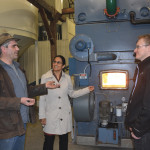The University of Winnipeg’s new biomass heating system will be a model for other institutions, say proponents of alternative energy sources
When school starts this fall, the University of Winnipeg will flip the switch on a novel way to keep downtown buildings heated — with boilers that burn wood pellets. Last fall the downtown university took delivery of two 100-kilowatt biomass boilers, to provide supplementary heating a steam plant now provides for its Ashdown, Manitoba and









